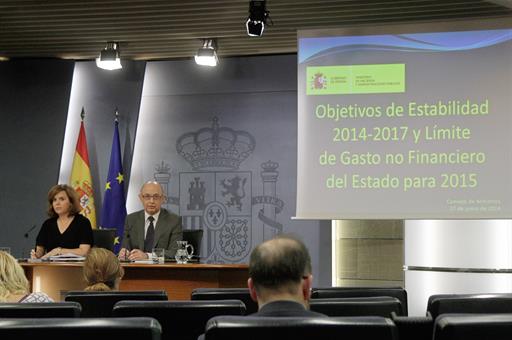Council of Ministers
Government sets ceiling on spending for 2015 at 129.06 billion euros, 3.2% less than for 2014
Council of Ministers - 2014.6.27
Moncloa Palace, Madrid
The Vice-President of the Government, Soraya Sáenz de Santamaría, underlined that the ceiling on spending shows that we will continue taking steps towards reducing the public deficit and towards fiscal consolidation, highlighting that the efforts made over the last few years "have enabled us to meet the targets while maintaining social spending". She also pointed out that the budget stability and public debt targets for the public authorities as a whole are "contention policies that will not result in any further adjustments".
Along the same lines, the Minister for the Treasury and the Public Administration Services, Cristóbal Montoro, stressed that, for the government, controlling and reducing the public debt are unavoidable. "Thanks to the controls on the public accounts and correcting our deficit, in Spain we are starting to enjoy economic recovery, albeit gradually". In this regard, he highlighted that we are in the fourth consecutive quarter of positive economic growth and in the initial stages of a job creation process, which is the main target of the social policy of our country, and this is viable thanks to the structural reforms and the fact that the control of the public deficit is taking hold.
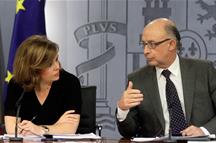 Pool Moncloa
Pool MoncloaCristóbal Montoro explained that the General State Budget for 2015, given the context of economic recovery, will seek to make reducing taxes compatible with the deficit targets. In this respect, he announced that "in absolute terms no new reduction of public spending is planned".
Economic recovery
The Minister for the Treasury and the Public Administration Services asserted that the macro-economic scenario will not change from that presented in the Stability Programme. "Spain will enjoy economic recovery from 2014 to 2017", he stated.
The minister pointed out that internal demand is starting to recover, consumption by the public administration services is decreasing and the private sector and public consumption "will begin their recovery as from 2014, which is the last year of economic recession in Spain". He also pointed out that net job creation will start to be seen as from 2014 and "it will double next year", and the unemployment rate will fall such that "by 2017, we will have an unemployment rate below 20%".
Deficit targets
The deficit targets will be 5.5% of GDP for 2014, 4.2% for 2015, 2.8% for 2016 and 1.1% for 2017. Central Government will progressively reduce its deficit to reach 1.1% of GDP by 2017. Both the Regional Governments and Local Authorities will have balanced budgets by 2017, as will the Social Security system.
Cristóbal Montoro recalled that last year the State provided almost 30 billion euros of funding to the Social Security system, representing almost three percentage points of GDP, to finance unemployment benefits and the lowest pensions, non-contributory pensions and minimum supplementary pensions. This justifies the State's high deficit, according to the minister.
Ceiling on State non-financial spending for 2015
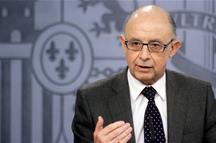 Pool Moncloa
Pool MoncloaThe Minister for the Treasury and the Public Administration Services announced that the ceiling on non-financial spending for 2015 will amount to 129.06 billion euros, a 3.2% reduction in GDP, or 4.2 billion euros, compared with the 2014 Budget.
The deficit target set for 2015 is 2.9% of GDP, equivalent to 30.96 billion euros. The forecast for non-financial State revenue for 2015 stands at 133.71 billion euros.
Cristóbal Montoro pointed out that "we will continue applying austerity policies in terms of public spending because the situation requires this as do our commitments to attaining this target".
However, this reduction in the ceiling on spending will not result in a fall in the budgets of individual ministerial departments, since savings are expected to be made in unemployment benefits, as "not many people will lose their job next year". Furthermore, "the saving on servicing debt will also be significant since the Treasury is financing this at historically low interest rates".
On another note, when asked about the issue, Cristóbal Montoro announced that, once the tax reform is approved, work will continue to be done on reforming the model of financing of the autonomous regions in the hope that political conflicts and the feeling of preferential treatment are avoided between the different regions.
As regards the date of publication of the so-called regional fiscal balances, the Minister for the Treasury stressed that drafting of the regional public accounts "is at a very advanced stage" and they could be published as soon as July. These will be published on a "regular" basis, since they will be "updated each year until total transparency is attained".
Other agreements
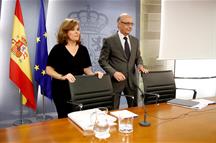 Pool Moncloa
Pool MoncloaThe Council of Minister agreed to submit to Parliament the Protocol modifying the Agreement between the Kingdom of Spain and the United States to avoid double taxation and prevent tax evasion.
The Vice-President of the Government, Soraya Sáenz de Santamaría, announced that this protocol establishes new taxes, exemptions and stimuli for business investment and updates the model for the exchange of information, according to the parameters set by the OECD, including the possibility of requesting banking information.
The government also approved a Royal Decree-Law developing the Rules of the Air and the common operating provisions for air navigation services and procedures. Soraya Sáenz de Santamaría remarked that the rules complement the European legal framework, aimed at improving air safety, increasing airspace capacity and reducing the environmental impact of flights.
The government also approved a Royal Decree-Law on restructuring the Household of His Majesty the King.
Privileges of King Juan Carlos
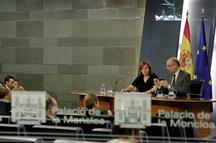 Pool Moncloa
Pool MoncloaWhen asked about the privileges afforded to King Juan Carlos, the Vice-President of the Government pointed out that the Lower House of Parliament has approved the legal regulation, with the support of the Partido Popular [People's Party], Unión del Pueblo Navarro [People's Union of Navarre] and Foro Asturias [Forum of Asturias].
Soraya Sáenz de Santamaría underlined that privileges are afforded in Spain to Members of the Upper and Lower Houses of Parliament, Cabinet Members, presidents of the regional governments and members of the regional parliaments, among others, but that the legal figure is not extended to a former Head of State, his consort, the consort of the current Head of State and the Prince or Princess of Asturias.
The Government Spokesperson recalled that privilege is not synonymous with "impunity". We are not saying that someone who enjoys privilege is not subject to criminal law or civil law for certain conduct". He added that "Inviolability in our country is afforded to the King for acts during his mandate and, in fact, subsequently, for prior acts". But all, from the King downwards, "are absolutely liable for their conduct if they fall under the Criminal Code or if provided for by law". The difference, she specified, is that in some cases these acts will be judged before the Supreme Court and in others by the Higher Courts of Justice of the Autonomous Regions.





